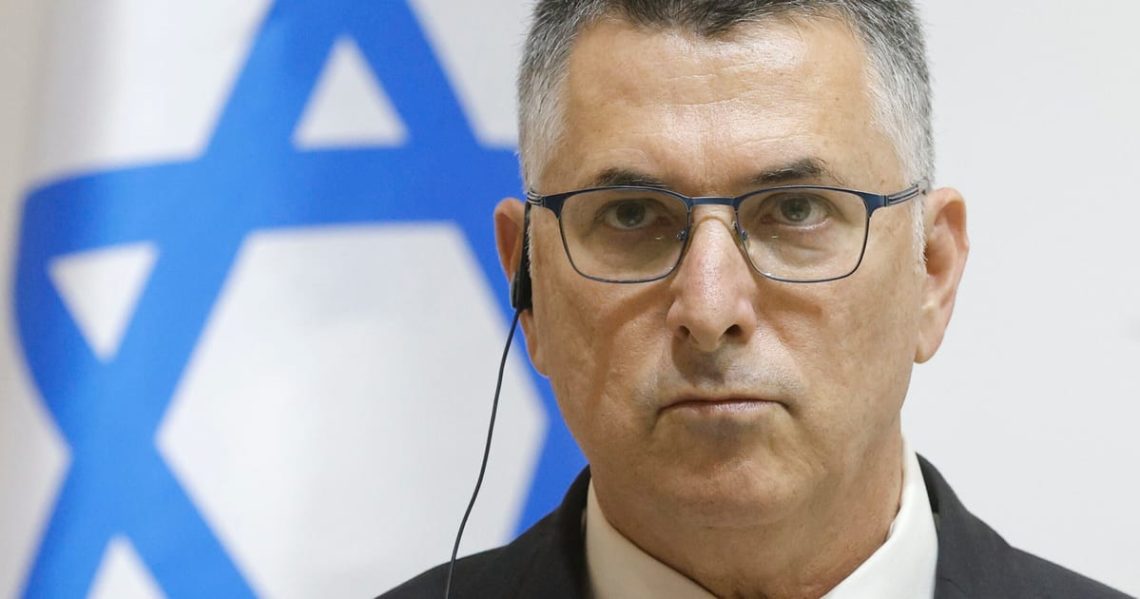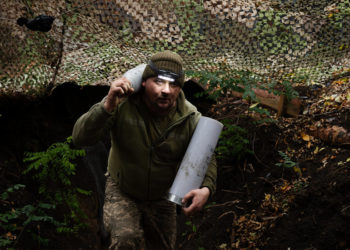Israel’s Foreign Minister Gideon Sa’ar accused the United Nations of bearing responsibility for aid distribution failures in the Gaza Strip, igniting a war of words with the international agency as starvation spreads in the war-torn territory.
Speaking to POLITICO, Sa’ar said that Israel had opened up more crossing points and was allowing more aid to enter Gaza under a deal struck with the European Union.
The problem was that the U.N. was failing to distribute more than 900 truckloads of aid parked in a fenced-off area near the Kerem Shalom crossing point in the Gaza Strip, he said. “The problem is the U.N. is not distributing [aid],” Sa’ar said in a phone interview from Ukraine, where he met President Volodymyr Zelenskyy and launched a “strategic dialogue” on Iran. “There are more than 900 trucks waiting … inside Gaza Strip, and they are just not distributing them to the people in Gaza.”
The assertion prompted a strong denial from the U.N., whose spokesperson, Stéphane Dujarric, placed blame for failures squarely at Israel’s feet.
“Kerem Shalom [a crossing point for humanitarian aid into Gaza] is not a McDonald’s drive through where we just pull up and pick up what we’ve ordered, right?” Dujarric told a press briefing in New York. “There are tremendous bureaucratic impediments. There are tremendous security impediments. And, frankly, I think there’s a lack of willingness to allow us to do our work.”
Sa’ar’s comments — which came during the first visit to Ukraine by a top Israeli official since 2023 — also contradicted EU officials who told diplomats on Wednesday that Israel was falling short of its commitment to let more aid enter Gaza, according to two EU diplomats. One of them said that the bloc’s assessment rested on the number of trucks entering Gaza daily, which remained below an agreed threshold.
In further comments to POLITICO, a spokesperson for the U.N. Office for the Coordination of Humanitarian Affairs (OCHA) said its personnel faced “immense bureaucratic challenges” to reach and distribute the aid: “We stand by to deliver at scale, as we did during the last ceasefire when 600 to 700 truckloads of aid were delivered daily. But for that, we need the right operational conditions on the ground, including approvals by the Israeli authorities for the U.N. and our partners to use safe routes within Gaza that don’t pose security threats.”
Philippe Lazzarini, the commissioner general of the U.N. agency for Palestinian refugees (UNRWA) said Thursday morning that the body has the equivalent of 6,000 loaded trucks of food and medical supplies waiting in Jordan and Egypt.
“Just outside Gaza, in warehouses — and even within Gaza itself — tonnes of food, clean water, medical supplies, shelter items and fuel sit untouched, with humanitarian organizations blocked from accessing or delivering them,” a statement by Medecins Sans Frontieres and over 100 other international aid organizations said Wednesday.
Asked whether Israel was stopping the U.N. from handing out aid, Sa’ar dismissed the claims as “lies.” The “U.N. is acting not with the mind of helping the people in Gaza, but how to delegitimize Israel,” he said.
Seeing Iran as a threat
In his comments to POLITICO, Sa’ar said his trip to Ukraine aimed to underscore Israeli backing for Kyiv, which has come mainly in the form of humanitarian aid rather than military backing. Both countries have been targeted by Iranian Shahed drones, which Iran has provided to Russia.
“We were always on Ukraine’s side. We have voted with Ukraine with one exception,” said Sa’ar, referring to a U.N. vote in February when Israel sided with the U.S. and Russia against a pro-Ukraine resolution in an overture to U.S. President Donald Trump. “Both countries [Israel and Ukraine] think Iran is a threat and therefore we have lot of the information and knowledge we can share.”
The minister, who stopped in Moldova after visiting Ukraine, also cast his country’s recent intervention in Syria as a last resort to protect a threatened Druze community and to stop further massacres of religious and ethnic minorities being carried out by Syrian “jihadist” forces, he said. Israel is now participating in U.S.-brokered peace negotiations with Syrian authorities in Damascus.
“It’s important that the international community will do something in order to protect minorities in Syria because during a few months we saw a huge massacre of the Alawites,” he said. “It is quite clear that Syria is a very dangerous place for ethnic minorities.”
“This is why we intervened,” he added.
Witkoff in Rome
Even so, the focus in Europe remains on Gaza.
Nearly two years after Israel invaded it, in response to the killing of some 1,200 Israelis by Hamas militants, several European countries as well as top EU officials are ramping up pressure on Israel to stop starvation and boost aid.
As of Thursday morning, 113 people — of which 81 are children — have died of malnutrition since the start of the war, Gaza’s Health Ministry said.
Earlier this week, European Commission President Ursula von der Leyen called images of suffering and starvation in Gaza “unbearable” and urged Israel to “deliver on its pledges” to the EU to deliver more aid. Meanwhile, press outlets including Agence-France Presse, Associated Press, BBC and Reuters have all called upon Israel to allow more journalists to enter Gaza and allow in more food, warning that their correspondents face starvation.
Nearly 60,000 people have been killed in Gaza since the start of the Israel-Hamas war, according to Gaza’s Health Ministry, which does not distinguish between combatants and non-combatants.
Twelve days after the signing of an EU-Israel agreement on aid distribution, EU officials told ambassadors on Wednesday that Israel was not living up to the deal’s terms — a charge that Sa’ar rejected. “All the things which are part of our understanding with the EU, we are implementing that,” he said. “We open more crossings to the north and to the south. We are doing a lot of efforts on various humanitarian issues.”
A group of 10 countries, including France, urged the Commission this week to come forward with new proposals to raise pressure on Israel. However, the push is unlikely to succeed given determined opposition from four countries — Germany, Italy, Czechia and Hungary — which form a blocking minority in the European Council, according to an EU diplomat.
With no unified EU position, some countries have discussed enacting their own sanctions, while the bloc’s top politicians have focused on pressing for a ceasefire. That is also the approach of Trump, who dispatched his negotiator Steve Witkoff to Rome on Thursday for talks about a ceasefire with Israeli Strategic Affairs Minister Ron Dermer and a Qatari official.
Asked about the prospects for a deal, Sa’ar said Israel was open to “anything constructive” in terms of proposals — before bemoaning the absence of a Hamas representative at the meeting. “We are there. They are not there,” he said.
The post Israel blames UN for Gaza aid failures appeared first on Politico.




